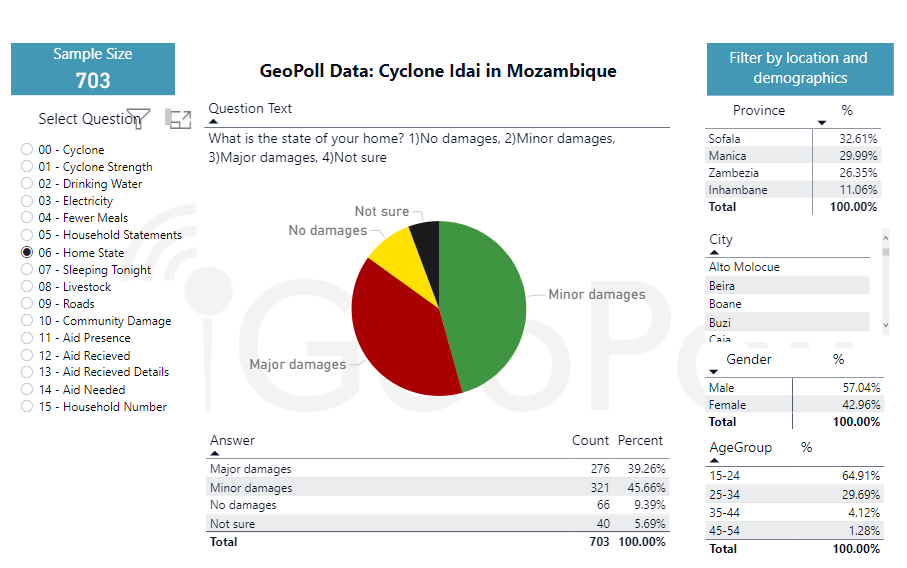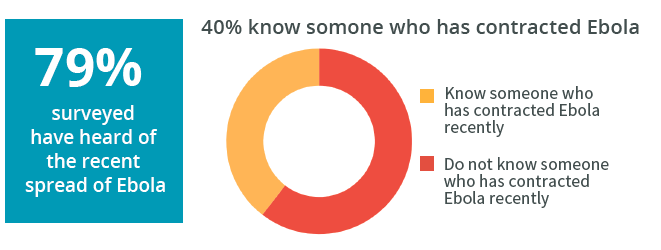When it comes to international development, relief and governance, data plays an integral role in understanding needs and measuring interventions’ success. In many times collecting such information is impossible or impractical face to face, and this is where remote data collection comes in.
In this article, we outline the various areas, from our experience, that remote surveying and data collection enhances the efforts of international development organizations, governments, local NGOs, and other partners. Click on the headings to learn more about our work, use cases, and methodologies.
Data for Humanitarian Aid and Relief
When Cyclone Idai hit Mozambique, it was difficult for aid groups to know immediate needs and areas they needed to focus on. During various Ebola outbreaks and West and Central Africa, it was also impossible to access affected areas due to lockdowns and the disease’s contagious nature. In both cases, and many more incidences of natural disaster, conflict, and disease when affected populations are cut off from the rest of the world, GeoPoll has deployed our unique remote data collection and messaging capabilities to collect on the ground data that helped aid organizations, governments and rescuers act decisively to save lives and property. 
Monitoring, Evaluation & Learning
Donors, NGOs, and governments often need to assess the effectiveness of their programs and interventions and communicate their successes. Using remote mobile surveys, such organizations can measure project processes, demonstrate community attitudes and perceptions over time, and track the outcomes of project interventions more effectively on the ground for better and timely decision-making.
Food Security and Agricultural Production
In many of the emerging markets, food security is usually a significant concern. Over the years, GeoPoll has worked with tens of development organizations to remotely track multiple types of food security data such as food prices, market operability status, crop harvest data, and frequency of meal consumption, both for emergency assessments, ongoing monitoring, and one-off analyses of specific areas or populations.
Health & Nutrition Data
Using remote on-the-ground data, organizations can monitor and improve health systems. For example, when COVID-19 struck in 2020, health and humanitarian organizations worked with GeoPoll to understand the impact on health and health systems in emerging nations. We have also helped gather sensitive health information that would have been difficult with face-to-face research.

Democracy & Governance
GeoPoll’s mobile research and engagement platform allows governments and democracy groups to reach citizens in remote areas or conflict zones quickly and safely. Organizations can administer remote surveys and educational messages to extremely specific target populations, giving them the ability to assess situations and act upon the most up-to-date information quickly. This can be useful in monitoring government services, assessing the political climate, promoting transparency such as by tracking corruption incidence, monitoring security situations, and more.
Financial Inclusion
One of the most integral steps to developing financial inclusion frameworks is gathering realities and the opinions of banked and unbanked populations. That way, organizations can track financial inclusion rates, evaluate access to financial services, research financing gaps, and track growing trends such as usage of mobile money, mobile loan usage, and more. Over time, GeoPoll has perfected its remote mobile surveying capabilities to enable financial stakeholders to gather ongoing data to measure trends or gather one-off data from specific populations on their financial needs.
Energy, Climate & Environment
Climate Change is one of the hottest topics of the Century. As the globe brainstorms ways to combat the climate and environmental degradation, it is crucial to understand the changes happening in all areas, even the remotest, how that affects essential aspects such as food security and resilience, and grassroots opinions on the course of action.
Education & Employment
In tracking education and employment changes and improvements over time, remote surveying helps gather direct feedback on education and employment from communities, teachers, students, and parents on key service delivery indicators, including absenteeism, textbook availability, student-teacher ratios, and school infrastructure. It also helps understand specific perceptions, behaviors, and knowledge to design campaigns that improve educational outcomes and obtain ongoing feedback on program interventions. Governments, the private sector and development organizations can also gather data on education levels and employment and link private sector, academic institutions, and job seekers.
GeoPoll’s International Development Research Work
GeoPoll regularly conducts international development research for United Nations agencies, NGOs, governments, humanitarian groups, and other stakeholders in the development and relief sectors. We help collect ongoing tracking data or one-time project-based data collection fast and affordably owing to our unique technology, robust database and direct integrations with mobile network operators that enable us to reach any population worldwide.
Learn more about GeoPoll’s international development and humanitarian work.
